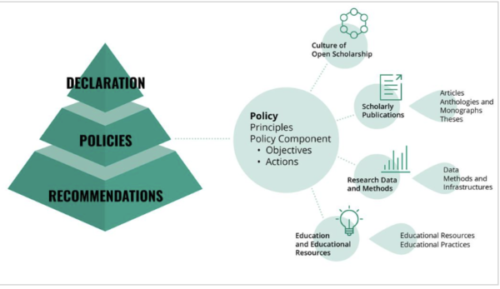CoNOSC Members start to talk about national OS Monitoring

Twelve countries attended the online CoNOSC Members meeting on 13 November 2023 at a very busy time of year. SPARC Europe, as facilitator of CoNSOC, brought together experts on Open Science Monitoring to discuss this important topic.
Ms Marita Kari, Senior Specialist, Secretariat for Open Science and Research,
Federation of Finnish Learned Societies, Finland opened the deep-dive session to speak about
Finnish open science and research monitoring. Principles and practices. She presented the Finnish broad encompassing OS monitoring model and also some of the principles, including that it is a mechanism to support organisations rather than rank them. It focussed on anlaysing progress on the Finnish Declaration for Open Science and Research and its supporting policies It began its monitoring activities in earnest in 2022 with a survey and saw a 100% response rate from universities, with another one planned for 2024. The research community and other related stakeholders were clearly supportive of the process and this was a key success factor. New indicators are being developed for 2024 on research data and collaboration and will be taken into account for 2024 monitoring. Data stewards will also be monitored. National monitoring is aligned with EOSC monitoring as much as possible so that research organisation only need to respond to the national survey.
For more on the Monitoring model for open science and research – Principles and practices, see here.
Ms Karen Sofie Hytteballe Ibanez, Senior advisor. Technical University of Denmark, NORA. Denmark. Presented The Danish Open Access Indicator – Monitoring the implementation of the Danish Open Access Strategy. She spoke about the national Danish strategy for Open Access (100% OA in 2025 with a max embargo of 12m), about the OA Indicator which has been running for a number of years and plans for the future. It used data from university CRIS systems to monitor OA material for its national targets and DOAJ, Unpaywall and Sherpa Romeo as authority and auxilliary data. Denmark monitors realised OA, unused OA rights and blocked OA. She showed how Denmark had closed the gap between what could have been made OA and was not (so-called “Unused OA rights”), over the years. Since its inception in 2016, Denmark was at 18% OA, and in April 2023, it was at 69%. Data is published, and this makes national results transparent and encourages competition between research organisations. Ibanez stated that the new 2023 evaluation process of this monitoring practice is quite thorough as it looks at international developments, the impact of TAs and Plan S and the development of publication costs. More information can be found here: https://www.oaindikator.dk/en/ and https://forskningsportal.dk/.
Ms Laetitia Bracco, Head of the research data support service of Université de Lorraine, France and project manager for the French Open Science Monitor on datasets and software then spoke on Monitoring Open Science beyond publications. She particularly focussed on how France had developed a system to assess open access to publications and research data and software, releasing the first indicators for these in 2023. Like Denmark, in 2022 France was at 67% OA. In 2021, 71% of doctoral theses were OA. She shared how challenging it was when looking at research data and software since there was no global database to draw on, that there were too many different identifiers for research data and that they do not yet play a strong role in research career assessment. Bracco then went on to describe the technical process of monitoring including downloading the PDFs of French publications and mining mentions of datasets and software and using DOIs and other MD elements from repositories. In 2021, almost 80% of publications had referred to datasets, although only 22% seem to share it. About 20% share their software. Bracco described that this needs a significant amount of computing power and PDFs can be difficult to locate so costs are considerable and this only related to English publications, although the process will work on French-language material next. It will also use new ORCID monitoring indicators. More information can be found here.
Mr Gareth O’Neill, Principal Consultant on Open Science at the Technopolis Group, was invited to update CoNOSC on the EOSC Observatory. This innovative new policy intelligence tool tracks policies and practices related to EOSC and Open Science, with a specific focus on supporting EOSC by assessing the EOSC readiness and EOSC financial commitments in European Member States and Associated Countries. The observatory provides visualisations of annually collected data from the countries across a range of policy categories, including publications, data, software, services, infrastructure, skills/training, assessment, and engagement. More information is here.
Mr Till Bruckner, the founder of the TranspariMED campaign for clinical trial transparency, drew lessons from monitoring clinical trial reporting practices. He noted that significant efforts had been made to improve transparency, such as the 2013 Declaration of Helsinki adopted by WHO and the EU regulation enacted in 2014. However, without effective monitoring, these efforts had only had limited impact. At least a quarter of all clinical trial results are still never made public. This leads to wasted research funds, harm to patients, and delays in scientific progress. He recommended stricter monitoring of drug trials and medical device trials by national regulatory bodies to address this issue. The UK was recognized as setting the gold standard in this regard. He briefly mentioned the EU Trials Tracker initiative, which consolidates valuable data, and acknowledged the innovative work done by Cancer Research UK in the field. More information on how to improve transparency can be read here: https://www.transparimed.org/resources
The session ended by wondering how we might bring these efforts together. UNESCO will be convening a meeting on OS Monitoring in Paris in December 2023 and some CoNOSC members will be present. We look forward to exploring more opportunities of collaboration in this field in 2024.
clinical trials Denmark Finland France monitor monitoring Open Access open science policymaking